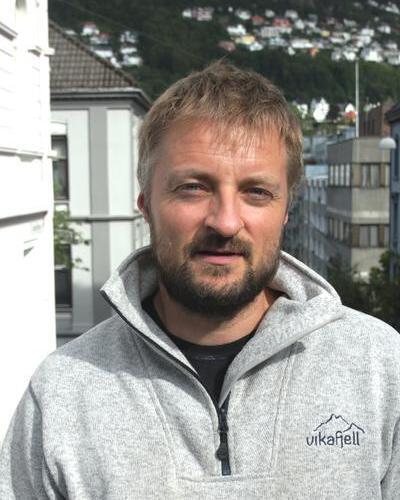The covid-19 pandemic: A watershed in the development of digital politics
Associate professor at UiB, Kjetil Rommetveit, has received funding from the Research Council of Norway (RCN) to study contact tracing under covid-19 as digital politics.

Main content
The project, CoPol: Covid-19 contact tracing as Digital Politics, was funded under the 2020 RCN call Researcher Project for Scientific Renewal, and takes as its starting point that the covid-19 pandemic is a constitutive moment in the evolution of digital politics, where fundamental relations between citizens and states, technologies and institutions are re-configured.
In the project, Rommetveit and his research group will study digital contact tracing over time and as social and data practice.
The covid-19 pandemic as a watershed
Rommetveit wrote the application in the period right after the first lockdown, when everything was very new and rapidly changing, but some tendencies were still clear to him:
"For those of us who study the relationship between science, technology and society, the covid-19 pandemic was and still is is a watershed moment: Tendencies present in the last ten to twenty years became reinforced, like digitalization and a focus on risk, danger and collective security, while other things were more surprising: How badly prepared for the pandemic the Western countries were; in spite of years of focusing on risk, security and digitalization."
Another tendency was the rapid digitalization of a range of functions, and that the digital infrastructure went from being one of many alternatives to becoming the critical infrastructure: Video conferences at work, in teaching, trade and communication, as well as a global surveillance of virus transmissions.
"Just take a look at how a company like Google created its own web page in order to track the spread of the virus, and together with Apple established the dominating platform for digital contact tracing."
Digital contact tracing – more than just an app
In the period from the application was sent to it was granted, the first Norwegian contact tracing app was discarded and substituted by a version that uses this platform by Google and Apple.
Since the RCN requires that you address risks in your applications, Rommetveit had already contended with the possibility that the current contact tracing app might be rejected.
"For this type of study, the app being discarded is not a disadvantage but rather a source of insight and data collection: What happened? Why wasn’t it possible to implement this nationally developed app? What came instead?"
He emphasizes that while the app itself is interesting, it is not the only important part of the project.
"Digital contact tracing depends on a whole school of techniques; several of them aimed at visualization. It’s this 'apparatus,' which Focault would have called it, that is important to understand: Not the single technological application."
A long-standing research interest in large digital systems
Kjetil Rommetveit could be said to be uniquely qualified to lead such a project. The associate professor at the Centre for the Study of the Sciences and the Humanities (SVT) has for several years studied the governance and use of large digital systems in fields like health and security.
He has led several projects about the use of digital technologies for addressing societal and political needs, like Technolife, EPINET, Designing Freedom and CANDID.
"Through these projects I’ve had a continuous focus on ethics and privacy, and the last couple of years, I have researched EU’s new framework, General Data Protection Regulation (GDPR), in particular. We have focused on the increasing use of organizational and technological instruments; like ‘built-in privacy’ – something that’s mandatory after the implementation of GDPR."
The importance of built-in privacy
With this background, Rommetveit has found it especially interesting to observe how these regulatory instruments were given central roles in the design of digital contact tracing.
"The Norwegian contact tracing app was abandoned for several reasons, but one of the most severe criticisms was that the app did not acceptably preserve the users’ right to protection of their personal data. Since we were in a state of emergency, and thus did not have time for a large debate, the dominant response was that such apps needed to have built-in privacy."
Rommetveit explains that you can see this on Apple and Google’s website about contact tracing: The technology giants created a common platform that made it possible for their respective platforms, iOs and Android, to communicate, and they argued that only they could implement 'built-in privacy.'
"This was indeed true, considering that the two of them, for all practical purposes, have had a monopoly on mobile technology in the Western world. Even European privacy supporters embraced the initiative; mainly because no other options existed. This is very interesting, also from a perspective of (the lack of) national sovereignty on fields characterized by extensive digitalization."
A changed societal order
Applications granted by the RCN under the call Researcher Project for Scientific Renewal have to show that they are novel and ambitious, and Rommetveit thinks that his project fulfilled this requirement in several ways:
"First of all, we still don’t have any good or extensive analyses of digital contact tracing in a larger perspective: not just as technology or public health, but also as fundamental rights and politics. Second, the integration of privacy in the technology itself, and the public reasoning for contact tracing as an instrument, is interesting."
With CoPol, Rommetveit hopes to be able to describe and analyze new constellations of expertise, technologies and institutions. This can further tell us something about a changed societal order and give us a deeper understanding of the connections between digital politics, fundamental rights and public health.




